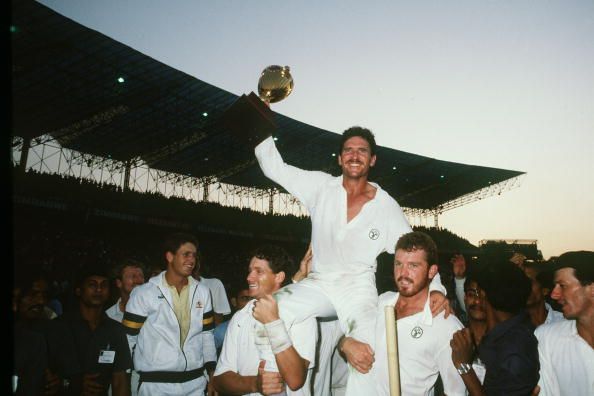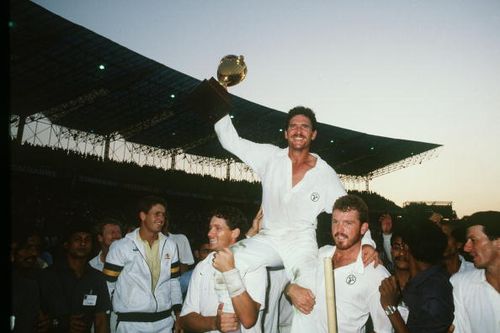
A look back at 1987 Cricket World Cup: Awesome Australia win maiden crown in sub-continent

Twelve long years and three editions later, the cricket World Cup left the shores of England to move to the sub-continent with India and Pakistan becoming the first co-hosts in 1987, and it saw a new title sponsor and produced a new champion.
The reign of 60-over matches gave way to the 50-over format due to light conditions in the sub-continent where eight teams -- seven Test playing countries and winner of the ICC trophy Zimbabwe -- locked horns in the month long (October 8-November 8) tournament played across 24 venues -- 14 in India and 10 in Pakistan. Of the 27 matches, India staged 17, Pakistan 10.
Rise of Australia’s new generation
A new look Australia, led by Allan Border, held their nerve in crunch situations to lift the trophy before 95,000 cheering spectators -- the largest in a World Cup game till then at the majestic Eden Gardens on November 8.
The final -- staged away from Lord's for the first time -- was evenly poised till England captain Mike Gatting lost his head and attempted a reverse sweep that led to his side's downfall. England eventually lost by seven runs, and Australian opener David Boon was adjudged man-of-the-match for his knock of 75.
The game's strong following in the sub-continent and India's title triumph in 1983 brought fans in droves to the stadia throughout the event, though both co-hosts crashed out in the semi-finals.
The cricketing world also watched with awe the maturing of a young Australian side, who bowled great restrictive stuff at the death and displayed a steely nerve in plundering runs match-after-match during the slog overs. Steve Waugh had arrived and, in the coming years, would go on to become one of the finest all-rounders and captains to have come from the Aussie stable.
Sunil Gavaskar bows out on a high
On the other hand, it was the swansong for the legendary Indian opener Sunil Gavaskar, who was playing his fourth World Cup. The technically sound batsman scored his only ODI hundred in his penultimate innings, notching up an unbeaten 103 against New Zealand. The century came as a big relief for the extraordinary batsman, who had, for the last 12 years, been facing criticism for the ignominious 174-ball 36* in the inaugural World Cup.
Indian pacer Chetan Sharma achieved the first hat-trick of the World Cup in the same game, seeing the back of Ken Rutherford, Ian Smith and Ewen Chatfield off successive balls. Gavaskar and Sharma were declared joint man-of-the-match as India sailed into the last four with a nine-wicket victory.
After the match, an emotional Gavaskar said: "I had a sleepless night. I have been struggling with migraine and fever on-and-off the field since Delhi. I didn't think I had the talent or stamina that you need to keep running in this sort of cricket. The talent to move away from stumps and still play powerful shots was never in me. It is certainly a memorable day."
However, the Indian fairy tale ended abruptly at the Wankhede stadium. England's centurion Graham Gooch and Gatting (56) played the sweep shot to telling effect against the two left-arm spinners -- Maninder Singh and Ravi Shastri. After England finished at 254/6, India seemed on target at 204/5 in 40 overs, but then collapsed suddenly to be all out for 219.
The other semi-final at Gaddafi Stadium in Lahore saw Australia post 267/6, but Pakistan paid the price for a bad start to fold up for 249.

Exemplary sportsmanship from Courtney Walsh and Kapil Dev
The fourth World Cup, called the Reliance World Cup after the new sponsors Reliance Industries, would remain etched in memory for the sportsmanship shown by West Indies pacer Courtney Walsh and India skipper Kapil Dev.
Turning out against Pakistan in a Group B match in Lahore, two-time winners West Indies were skittled out for only 216 in the face of some fiery bowling by Imran Khan, Saleem Jaffar and Wasim Akram.
The match turned close and Pakistan needed two runs for victory with only one ball remaining. Ace spinner Abdul Qadir was on strike against Walsh.
When Walsh was about to bowl, he found non-striker Saleem Jaffar out of the crease. The Caribbean pacer could have run him out to clinch the game for the Windies, but showing exemplary sportsmanship, Walsh just cautioned Jaffar and went back to his run-up. Qadir took two runs from the delivery to put Pakistan in the semis and knock out the West Indies.
Later, Walsh was rewarded by the World Cup Committee. A commoner presented him a handwoven carpet for his generosity.
The other incident occurred in the inaugural game featuring India and Australia at Chepauk. Put in to bat, Australia had made a sound start, courtesy a century plus opening stand between David Boon (49) and man-of-the-match Geoff Marsh (110).
Dean Jones, who came in after Boon's dismissal, pulled Maninder, and Shastri failed to take the catch in the deep. In the process, the ball crossed the boundary.
The umpire asked Shastri whether it was a four or a six, but Shastri was not sure, and the umpires signalled a boundary. But the Australians insisted it went over the boundary and took the matter to match referee Hanif Mohammad.
At the lunch break, Kapil concurred with the Australians and two more runs were added to the visitors' total, which went up to 270. And astonishingly, India were all out for 269 and lost the match by only one run!
(Kushal Chakraborty is a freelancer. He can be contacted at kushalsbi@rediffmail.com)